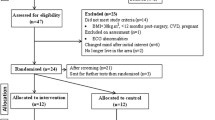Abstract
Background
Exercise is a strong determinant of prolonged weight loss in non-surgical patients. Studies evaluating the impact of exercise beyond the first year after bariatric surgery are lacking. We analyzed the relationship between reported intentional exercise and medium-term weight loss following bariatric surgery.
Methods
Patients who underwent bariatric surgery from 2007 thru 2013 completed a follow-up telephone survey and were separated into groups based on reported weekly exercise, i.e., < 90 min week−1, 90–200 min week−1, and > 200 min week−1. Standardized weight loss measures including percent of total weight loss, percent of excess body mass index (BMI) loss, percent of excess weight loss, and change in BMI were compared using analysis of covariance, with years from surgery as the covariant.
Results
A total of 872 patients were included in this study (age = 48 ± 10 years; BMI = 48 ± 7 kg/m2), with a mean post-surgery follow-up of 39 ± 14 months. Patients reporting > 200 min week−1 of planned exercise had greater weight loss than those who did less than 90 min week−1 (p < 0.05). No significant difference was found between those who reported less than 90 min week−1and those reporting between 91 and 200 min week−1.
Conclusions
This study suggests that regular exercise in excess of 200 min week−1 is associated with greater medium-term weight loss following laparoscopic bariatric surgery. Multidisciplinary bariatric surgery teams should consider emphasizing exercise at this level to help patients achieve optimal weight loss.



Similar content being viewed by others

References
Carnero EA, Dubis GS, Hames KC, et al. Randomized trial reveals that physical activity and energy expenditure are associated with weight and body composition after RYGB. Obesity (Silver Spring). 2017;25(7):1206–16.
Karmali S, Brar B, Shi X, et al. Weight recidivism post-bariatric surgery: a systematic review. Obes Surg. 2013;23(11):1922–33.
Lauti M, Kularatna M, Hill AG, et al. Weight regain following sleeve gastrectomy-a systematic review. Obes Surg. 2016;26(6):1326–34.
Egberts K, Brown WA, Brennan L, et al. Does exercise improve weight loss after bariatric surgery? A systematic review. Obes Surg. 2012;22(2):335–41.
Donnelly JE, Blair SN, Jakicic JM, et al. American College of Sports Medicine Position Stand. Appropriate physical activity intervention strategies for weight loss and prevention of weight regain for adults. Med Sci Sports Exerc. 2009;41(2):459–71.
Evans RK, Bond DS, Wolfe LG, et al. Participation in 150 min/wk of moderate or higher intensity physical activity yields greater weight loss after gastric bypass surgery. Surg Obes Relat Dis. 2007;3(5):526–30.
Woodlief TL, Carnero EA, Standley RA, et al. Dose response of exercise training following roux-en-Y gastric bypass surgery: a randomized trial. Obesity (Silver Spring). 2015;23(12):2454–61.
Watson KB, Frederick GM, Harris CD, et al. U.S. adults' participation in specific activities: behavioral risk factor surveillance system--2011. J Phys Act Health. 2015;12(Suppl 1):S3–10.
Brethauer SA, Kim J, el Chaar M, et al. Standardized outcomes reporting in metabolic and bariatric surgery. Surg Obes Relat Dis. 2015;11(3):489–506.
Schoeller DA, Shay K, Kushner RF. How much physical activity is needed to minimize weight gain in previously obese women? Am J Clin Nutr. 1997;66(3):551–6.
Fothergill E, Guo J, Howard L, et al. Persistent metabolic adaptation 6 years after “the biggest loser” competition. Obesity (Silver Spring). 2016;24(8):1612–9.
Carey DG, Pliego GJ, Raymond RL. Body composition and metabolic changes following bariatric surgery: effects on fat mass, lean mass and basal metabolic rate: six months to one-year follow-up. Obes Surg. 2006;16(12):1602–8.
Baldwin KM, Joanisse DR, Haddad F, et al. Effects of weight loss and leptin on skeletal muscle in human subjects. Am J Physiol Regul Integr Comp Physiol. 2011;301(5):R1259–66.
Gallicchio L, Schilling C, Miller SR, et al. Correlates of depressive symptoms among women undergoing the menopausal transition. J Psychosom Res. 2007;63(3):263–8.
Haarasilta LM, Marttunen MJ, Kaprio JA, et al. Correlates of depression in a representative nationwide sample of adolescents (15-19 years) and young adults (20-24 years). Eur J Pub Health. 2004;14(3):280–5.
Records K, Keller C, Coonrod D, et al. Correlates of depressive symptoms after birth for Latinas who are overweight or obese. Health Care Women Int. 2015;36(3):356–74.
Hakola L, Hassinen M, Komulainen P, et al. Correlates of low physical activity levels in aging men and women: the DR’s EXTRA Study (ISRCTN45977199). J Aging Phys Act. 2015;23(2):247–55.
Polanka BM, Vrany EA, Patel J, et al. Depressive disorder subtypes as predictors of incident obesity in US adults: moderation by race/ethnicity. Am J Epidemiol. 2017;185(9):734–42.
Alger-Mayer S, Rosati C, Polimeni JM, et al. Preoperative binge eating status and gastric bypass surgery: a long-term outcome study. Obes Surg. 2009;19(2):139–45.
Merrill RM, Richardson JS. Validity of self-reported height, weight, and body mass index: findings from the National Health and Nutrition Examination Survey, 2001-2006. Prev Chronic Dis. 2009;6(4):A121.
Bowring AL, Peeters A, Freak-Poli R, et al. Measuring the accuracy of self-reported height and weight in a community-based sample of young people. BMC Med Res Methodol. 2012;12:175.
Carlin AM, Zeni TM, English WJ, et al. The comparative effectiveness of sleeve gastrectomy, gastric bypass, and adjustable gastric banding procedures for the treatment of morbid obesity. Ann Surg. 2013;257(5):791–7.
Carlin AM, Yager KM, Rao DS. Vitamin D depletion impairs hypertension resolution after Roux-en-Y gastric bypass. Am J Surg. 2008;195(3):349–52. discussion 52
Author information
Authors and Affiliations
Corresponding author
Ethics declarations
All procedures performed involving human participants were in accordance with the ethical standards of the institutional and/or national research committee and with the 1964 Helsinki declaration and its later amendments or comparable ethical standards.
Conflicts of Interest
The authors declare that they have no conflict of interest.
Rights and permissions
About this article
Cite this article
Kerrigan, D.J., Carlin, A.M., Munie, S. et al. A Cross-sectional Study of Reported Exercise and Medium-Term Weight Loss Following Laparoscopic Bariatric Surgery. OBES SURG 28, 3923–3928 (2018). https://doi.org/10.1007/s11695-018-3434-2
Published:
Issue Date:
DOI: https://doi.org/10.1007/s11695-018-3434-2



